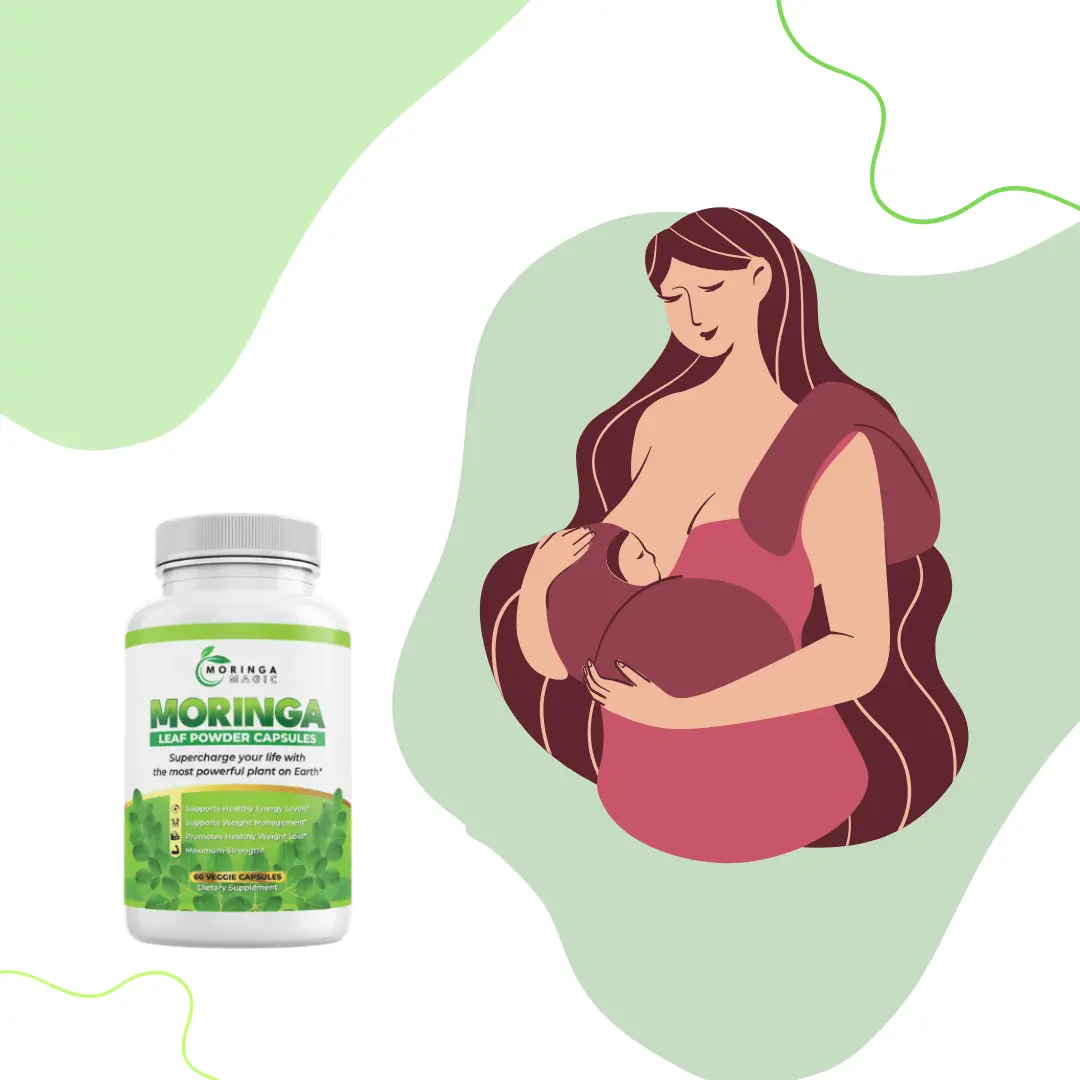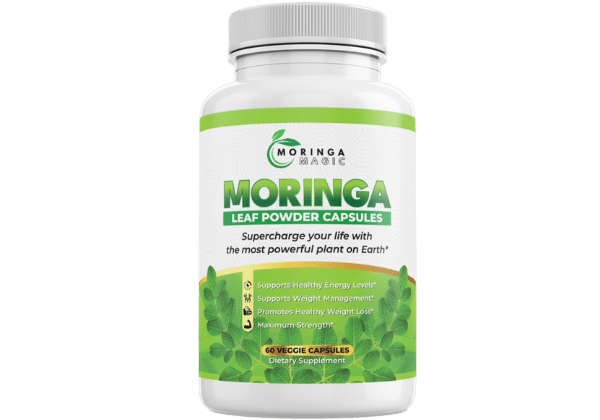
Moringa Supplements and Breastfeeding: A Comprehensive Guide to Benefits, Safety, and Best Practices
Moringa oleifera, often called the “miracle tree” or “drumstick tree,” has been used for centuries in traditional medicine due to its exceptional nutritional profile. In recent years, moringa during breastfeeding has gained attention for its potential to boost milk production and provide essential nutrients to both mother and baby. This blog explores everything you need to know about moringa supplements while nursing, including benefits, safety, dosage, and practical ways to incorporate it into your diet.
Table of Contents
- Understanding Moringa’s Nutritional Profile
- Moringa as a Natural Galactagogue
- Scientific Evidence Supporting Moringa for Lactation
- Safety Considerations for Taking Moringa During Breastfeeding
- Recommended Dosage for Breastfeeding Mothers
- Additional Health Benefits of Moringa for Nursing Mothers
- How to Incorporate Moringa into Your Diet While Breastfeeding
- FAQs About Moringa During Breastfeeding
- Final Thoughts
Understanding Moringa’s Nutritional Profile
Moringa is considered a superfood due to its high concentration of vitamins, minerals, and antioxidants. A single serving of moringa contains:
- Vitamins: A, B1, B2, B3, B6, C, and E
- Minerals: Calcium, iron, magnesium, potassium, phosphorus, and zinc
- Protein: High-quality plant protein, containing all nine essential amino acids
- Antioxidants: Powerful compounds like quercetin and chlorogenic acid that fight inflammation and oxidative stress
Because of these nutrients, moringa is often used to support postpartum recovery, strengthen the immune system, and improve energy levels. But one of its most compelling benefits is its potential role as a natural galactagogue—a substance that promotes lactation.
Moringa as a Natural Galactagogue
Many breastfeeding mothers struggle with low milk supply, leading them to seek natural ways to boost lactation. Moringa has been traditionally used in various cultures as a milk-enhancing supplement, and modern science supports this claim.
How Does Moringa Help Increase Breast Milk Supply?
- Boosts Prolactin Levels: Prolactin is the hormone responsible for milk production. Some studies suggest that moringa can increase prolactin levels, leading to greater milk volume.
- Nutrient-Dense Support: The high concentration of iron, calcium, and vitamins in moringa ensures that both mother and baby receive optimal nutrition, improving overall lactation quality.
- Improves Energy Levels: Many new mothers feel exhausted postpartum. Moringa’s rich iron and B-vitamin content help combat fatigue, indirectly supporting healthy breastfeeding.
Scientific Evidence Supporting Moringa for Lactation
- A study published in the Journal of Pediatrics and Child Health found that lactating mothers who took moringa supplements produced significantly more breast milk compared to those who did not.
- A randomized controlled trial reported that women who consumed moringa capsules had a 152% increase in breast milk volume within a few days of supplementation.
These findings suggest that moringa may be an effective natural supplement for enhancing milk production, particularly for mothers experiencing low supply.
Safety Considerations for Taking Moringa During Breastfeeding
Moringa is generally considered safe for breastfeeding mothers, but there are a few things to keep in mind:
Who Should Avoid Moringa?
- Women with low blood pressure, as moringa may cause a further drop.
- Those on blood-thinning medications, since moringa can promote clotting.
- Mothers with thyroid conditions, as moringa can affect thyroid function in some individuals.
Possible Side Effects of Moringa
- Mild digestive issues such as bloating or diarrhea (more common with high doses).
- A potential drop in blood sugar levels, which could be a concern for diabetic mothers.
Recommended Dosage for Breastfeeding Mothers
While there is no universal dosage, most studies suggest starting with 500mg to 1000mg of moringa leaf extract per day. If using moringa powder, 1 to 2 teaspoons (2-4 grams) daily is considered safe and effective.
Always consult with your healthcare provider before introducing any new supplement into your postpartum routine.
Additional Health Benefits of Moringa for Nursing Mothers
Apart from increasing breast milk supply, moringa offers several other postpartum benefits:
- Supports Postpartum Recovery: The postpartum period is a time of healing and regeneration. Moringa’s anti-inflammatory properties help reduce swelling and promote faster recovery.
- Prevents Postpartum Anemia: Iron deficiency is common after childbirth, leading to fatigue and dizziness. Moringa contains high levels of iron and vitamin C, which help boost red blood cell production and prevent anemia.
- Strengthens the Immune System: Moringa’s antioxidants and antimicrobial properties help protect both mother and baby from infections and illnesses.
- Aids in Healthy Digestion: Hormonal changes and stress can lead to digestive problems postpartum. Moringa contains fiber and plant-based compounds that promote gut health and ease constipation.
- Promotes Better Sleep and Reduces Stress: New mothers often struggle with disrupted sleep patterns. Moringa contains magnesium and tryptophan, both of which contribute to better sleep and mood regulation.
How to Incorporate Moringa into Your Diet While Breastfeeding
Moringa comes in various forms, making it easy to include in your daily diet:
-
Moringa Powder
- Mix 1 teaspoon into smoothies, oatmeal, or yogurt.
- Stir into soups, curries, or salad dressings.
- Blend with milk or almond milk for a nourishing latte.
-
Moringa Capsules
- Take 500mg to 1000mg daily, as recommended by your healthcare provider.
-
- Brew moringa leaves in hot water for a soothing, nutrient-rich tea.
FAQs About Moringa During Breastfeeding
- How soon can I start taking moringa after giving birth?
- Moringa can be introduced as early as the first few days postpartum to support lactation. However, check with your doctor before starting supplementation.
- Can moringa replace prenatal vitamins while breastfeeding?
- While moringa is highly nutritious, it should be used as a supplement to, not a replacement for, prenatal vitamins.
- Is it safe to take moringa every day while breastfeeding?
- Yes, moringa is generally safe for daily use. Just ensure you stick to recommended dosages.
- Can moringa help with postpartum weight loss?
- Yes! Moringa is low in calories but high in fiber and protein, making it a great addition to a healthy postpartum diet.
- Can moringa cause allergies in babies?
- Moringa allergies are rare. However, if you notice any unusual symptoms in your baby, such as rashes or digestive discomfort, stop use and consult a pediatrician.
Final Thoughts
Moringa is a natural, nutrient-dense supplement that offers numerous benefits for breastfeeding mothers. From increasing breast milk supply to improving energy levels, digestion, and immune function, it’s an excellent addition to a postpartum diet.
However, every mother’s body is different, so it’s essential to monitor your response to moringa and consult with a healthcare provider before making it a regular part of your routine.
References:
- National Institute of Health – Effects of Moringa on Breastfeeding
- Journal of Pediatrics and Child Health – Moringa and Lactation
- Herbal Doula – Moringa During Pregnancy & Breastfeeding

Experience the Power of Moringa
Transform your health with our premium Moringa supplements. Made from organically grown leaves, our supplements are packed with essential nutrients for your well-being.
Shop Premium Moringa Supplements